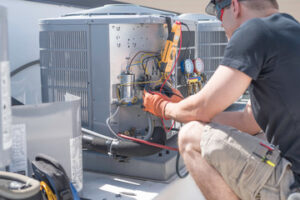Plumbing Express, Inc. involves pipes, fixtures and fittings that distribute water and remove waste. It is one of the most important aspects of building construction and maintenance.

The piping in your home can be made from copper, iron or galvanized steel. You may also have plastic piping, which is called PEX or cross-linked polyethylene (CPX). Different types of pipes last for different amounts of time.
Plumbing is a complicated and extensive system that conveys water in buildings. It includes the distribution of clean water and the removal of wastes in residential and commercial structures. It also involves the installation and maintenance of water heaters and other household appliances. Moreover, plumbing work includes the installation of drainage systems and venting. The pipes used in plumbing are usually made of copper, PVC, PEX, or galvanized steel.
The basic plumbing system consists of pipes that carry fresh water to fixtures and drain away wastes. The pipes are connected to a water supply source such as a public water system or a private well. The system also has a drainage system that connects to sewers or septic tanks. A good plumber will ensure that the fresh and waste water are separated to prevent contamination of the drinking water supply.
Most of the plumbing work in a house is done in the basement or behind the walls. Only a licensed plumber can access these areas and repair or install plumbing. For this reason, it is essential to find a professional when you have issues with your plumbing. A good plumber will be able to diagnose and fix any problems quickly.
Home plumbing is more complex than what people think. There is a lot of interconnected pipes and valves that control the flow of water throughout a house. A basic understanding of plumbing can help you save money and prevent major problems. For example, knowing that a leaky faucet can lead to a huge water bill is important. Also, if your home’s water pressure is low, it’s best to call in a plumber instead of trying to fix the problem yourself.
Plumbing is a complex system that requires knowledge of the local building codes and regulations. It also requires specialized training and skills. You can become a plumber through on-the-job experience or by attending a vocational school. Vocational schools offer certificate programs that prepare you for the career. In addition, community colleges offer associate degree programs in plumbing. Some colleges even offer bachelor’s and master’s degrees in plumbing.
Local Regulations
Whether you’re in the market for a new toilet or looking to make some major plumbing renovations, you want to work with professionals who follow local regulations. This ensures your projects comply with industry standards and are safe for you, your family, and the environment. In addition, adherence to local codes helps you avoid penalties and insurance issues down the road.
Across the country, different cities and counties have their own sets of rules that determine how to install and repair plumbing systems. These are often called plumbing or sanitation codes, and they dictate the minimum standards for a home’s water system. They cover everything from bathroom layouts to the quality and size of piping used in plumbing fixtures. For instance, a bathroom fixture may be required to have a certain maximum flow rate, which protects the environment and conserves water. Pipes must also be properly sized to prevent overflowing and potential leaks.
For example, drainpipes must be pitched correctly to prevent sewage backflow and reduce the risk of basement flooding. A typical slope is 1/4 inch per foot, though the pitch will vary by city and local code. In some cases, a special permit is required for some types of construction or remodeling projects.
Additionally, some types of pipes must be inspected and certified as non-corrosive or lead-free by an official inspector before they can be installed in homes. This is because pipes made from these materials aren’t suitable for all purposes, and they can potentially contaminate water supplies or cause health problems in those who use them.
Local law 152 is an important part of keeping New York City’s buildings and their residents safe. It mandates that gas piping be inspected periodically to prevent potentially dangerous leaks. This requires a commitment to excellence that entails adherence to all safety regulations and meticulous attention to detail during inspections.
Federal Regulations
The federal government plays a major role in shaping plumbing regulations. In addition to enforcing environmental laws, it also has strict guidelines for manufacturers who produce appliances like toilets and faucets. These standards encourage more efficient water usage as communities take firmer stands against climate change-induced droughts. Plumbers and plumbing students must adhere to these standards to help homeowners reduce their energy costs.
The Reduction of Lead in Drinking Water Act of 2011 (RLDWA) amended section 1417 of the Safe Drinking Water Act (SDWA). It requires that any pipe, fitting, or fixture used for delivering potable water to consumers must be lead free. It also lowered the maximum allowable lead content of wetted surfaces of pipes, pipe fittings, and fixtures to 0.25 percent by weighted average.
EPA issued its final rule to implement the RLDWA in 2016. The final rule establishes a compliance schedule for reducing the lead content of pipes, pipe fittings, and fixtures that deliver potable water to consumers by 50 to 75 percent by 2026. It also establishes a process for third party and self-certification of plumbing products and provides for product labeling. The final rule also provides exemptions from the lead free requirements for products that are used exclusively in nonpotable services or for commercial/industrial use.
For cost analyses, EPA contacted eight ANSI accredited, third party certification bodies to obtain estimated costs for testing and certifying plumbing components for compliance with the standard. These estimates were based on four representative product categories. The estimated costs for initial and renewal certification units were then multiplied by the number of new labeling and self-certification units EPA expects to be produced under the final rule.
During the public comment period on this issue, a significant portion of the comments favored a requirement for third party certification and opposed any provision that would allow self-certification of plumbing products. In response to these concerns, EPA revised the size criteria for firms eligible for self-certification to limit eligibility to those with 100 or fewer employees. This was done to avoid placing significant burdens on the smallest plumbing manufacturers, as many of whom are likely already using third party certification bodies for their products.
Certification
If you are looking to become a plumber, there are many ways to get the proper training. You can take a formal apprenticeship through a trade organization or a college degree program. You can also take a vocational school course that covers the skills and knowledge you need for a successful plumbing career, including Occupational Safety and Health Administration (OSHA) certification, blueprint reading, state codes and more.
Depending on your local regulations, you may be required to obtain a license to work in the field. For example, in New York City, you will need to pass an exam and have a minimum of two years of on-the-job experience, which can be met through a formal union or trade organization apprenticeship or a college degree program that includes a plumbing curriculum. You can find a variety of educational resources to prepare for the licensing exam, including study guides and practice tests.
Once you have obtained a license, it is important to maintain your knowledge by participating in continuing education courses. Some of these courses focus on specific topics like water conservation, while others are more general and focus on best practices for plumbing. You can find a variety of courses to meet your needs by visiting the website of the association that regulates plumbers in your area.
Plumbers are some of the most skilled workers in the construction industry and can make a good living. However, the job can be hazardous, and it’s vital that you have the proper qualifications to work as a plumber. Getting certified can help you avoid potential hazards and provide customers with confidence that your work is high-quality.
While it isn’t required in all states, becoming a licensed plumber is an excellent way to build your resume and ensure that you have the proper knowledge and skills to perform quality plumbing work. It can be difficult to find a job without a license, and there are serious penalties for conducting plumbing work without one. If you’re ready to start your journey to become a licensed plumber, contact the reputable trade schools for more information on training and certification.







